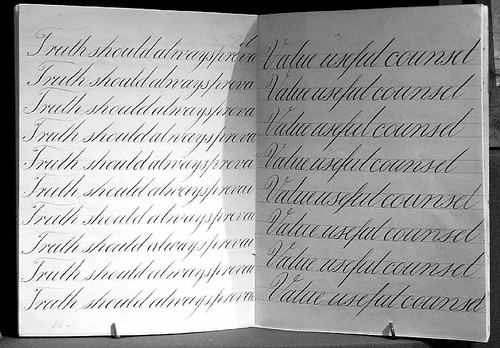The Gods of the Copybook Headings
Then the Gods of the Market tumbled, and their smooth-tongued wizards withdrew...
A copybook was an exercise book used by school children to practice their handwriting in. The pages were blank except for horizontal rulings and a printed specimen of perfect handwriting at the top that students were supposed to copy all down the page. The specimens were proverbs or quotations, or little commonplace sayings designed to inculcate the young with the wisdom and truth of the ages. These were the copybook headings.
Kipling's poem, The Gods of the Copybook Headings, talks of the enduring nature of those old wise sayings, and the cruel lessons they instill when the march of progress falters and the marketplace of trends and fads and fashionable thinking fails to heed the gospel of old fashioned common sense. AS I PASS through my incarnations in every age and race,
AS I PASS through my incarnations in every age and race,
I make my proper prostrations to the Gods of the Market Place.
Peering through reverent fingers I watch them flourish and fall,
And the Gods of the Copybook Headings, I notice, outlast them all.
We were living in trees when they met us. They showed us each in turn
That Water would certainly wet us, as Fire would certainly burn:
But we found them lacking in Uplift, Vision and Breadth of Mind,
So we left them to teach the Gorillas while we followed the March of Mankind.
We moved as the Spirit listed. They never altered their pace,
Being neither cloud nor wind-borne like the Gods of the Market Place.
But they always caught up with our progress, and presently word would come
That a tribe had been wiped off its icefield, or the lights had gone out in Rome.
With the Hopes that our World is built on they were utterly out of touch
They denied that the Moon was Stilton; they denied she was even Dutch
They denied that Wishes were Horses; they denied that a Pig had Wings.
So we worshipped the Gods of the Market Who promised these beautiful things.
When the Cambrian measures were forming, They promised perpetual peace.
They swore, if we gave them our weapons, that the wars of the tribes would cease.
But when we disarmed They sold us and delivered us bound to our foe,
And the Gods of the Copybook Heading said: "Stick to the Devil you know."
On the first Feminian Sandstones we were promised the Fuller Life
(Which started by loving our neighbour and ended by loving his wife)
Till our women had no more children and the men lost reason and faith,
And the Gods of the Copybook Headings said: "The Wages of Sin is Death."
In the Carboniferous Epoch we were promised abundance for all,
By robbing selected Peter to pay for collective Paul;
But, though we had plenty of money, there was nothing our money could buy,
And the Gods of the Copybook Headings said: "If you don't work you die."
Then the Gods of the Market tumbled, and their smooth-tongued wizards withdrew
And the hearts of the meanest were humbled and began to believe it was true
That All is not Gold that Glitters, and Two and Two make Four
And the Gods of the Copybook Headings limped up to explain it once more.
* * * * *
AS IT WILL BE in the future, it was at the birth of Man
There are only four things certain since Social Progress began.
That the Dog returns to his Vomit and the Sow returns to her Mire,
And the burnt Fool's bandaged finger goes wabbling back to the Fire;
And that after this is accomplished, and the brave new world begins
When all men are paid for existing and no man must pay for his sins
As surely as Water will wet us, as surely as Fire will burn
The Gods of the Copybook Headings with terror and slaughter return!
— Rudyard Kipling, October 1919
 Vice-Regal Saint:
Vice-Regal Saint: 








































.gif)

.gif)















































































































6 comments:
We would practice our handwriting regularly - some of us would even get "lines". Pages and pages of famous sayings and phrases. However, if the handwriting was "rubbish" or if it provoked the response, "What's this mess, are you having a laugh?", the books would be thrown at us and we'd do them again - in our own time.
One of my favourite quotations of wisdom, is one many ignore at their peril - "Spare the rod, spoil the child."
:-)
One of the links points to a blog in which the author recommends republics- an odd thing for a Monarchist blog, sending readers there, isn't it?
Not at all.
Websites recommending that we live in a republic often offer great comic value without realising it - doing our cause the world of good into the bargain.
Have you read any of them lately?
Here are my particular favourites with a Welsh theme.
http://www.iforbach.demon.c
o.uk/no_more_fairy_tales1.htm
http://groups.msn.com/WelshRe
publicanComment/
http://independe
nt-wales.blogspot.com/
Hee! Hee!
I'd read them for hours, if they were lengthy enough.
The owner of that blog is a gentleman scribe here at T.M., and posts under the name, Kipling. He is a monarchist by tradition, not by philosophical inclination. In the absence of tradition, he favours a constitutional republic on rational grounds. Feel free to read his essay, "Why Monarchy, Why Tradition?"
Thank you for the reference, Beaverbrook. I note with some amusement that I am the opposite of your description; I favour Monarchy, Constitutional Monarchy, on rational grounds. Having studied tradition and knowing it often to be invented, misrepresented, and subject to fashion, I find it rather shaky ground on which to base important decisions. I do look forward to reading the piece.
It appears we have our wires crossed.
I thought you were referring to Holden Republic who is listed under Gentlemen Royalists.
Mind you, Holden is certainly comic value.
Post a Comment